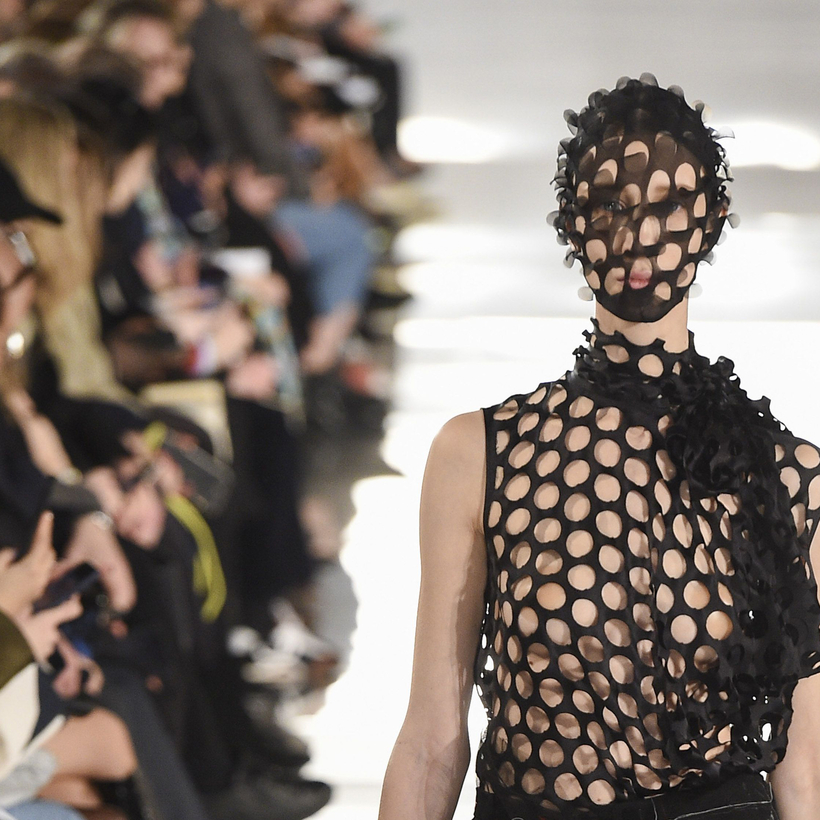However true the stereotype of fashion folk as magnificent hysterics can sometimes be, at the close of fashion month, Air Mail reports that equanimity may be even more contagious than the coronavirus. Those stiff upper lips were not brought to you by Restylane, for once. The fashion pack is just. So. Over. The. Drama.
It didn’t start out that way. Earlier this week, the wires reported that the largest known outbreak of the coronavirus outside of Asia is concentrated in Lombardy. Lombardy’s capital, Milan, was hosting Fashion Week, the twice-yearly carnival of mildly undernourished and deeply tired editors, buyers, designers, hair and makeup people, models, and photographers gathering in a succession of poorly ventilated spaces to double-kiss and share passed hors d’oeuvres.
As the week came to a close, signaling mass exodus to Paris, quarantines were being recommended and no one could talk of anything else. “The plane out of Milan was like Argo,” said Laura Brown, editor in chief of InStyle magazine. She had kept a low profile in Milan anyway, due to a case of food poisoning, but “there was this panicky apprehension in the air.... Fashion people clack on during the best of times. Fashion people plus a new disease is like, God, shut up.” That said, only a handful of masks were spotted at Linate Airport, where the short-haul flights to Paris come and go. And during the Milan shows, only one masked woman turned heads—but that’s because she was at Fendi, and had customized her protective gear with double F’s. (Fendi makes their own, but it is now, unsurprisingly, out of stock. That said, if the next pandemic strikes after they can restock, the Fendi “FF Pollution Mask” comes in the fashion house’s signature brown logo-printed silk with black trim, and retails for $241.)
“The plane out of Milan was like Argo.”
Perhaps it’s a question of culture. In Asian countries, wearing a mask when you are sick is a fairly anodyne gesture of courtesy to keep your illness from spreading. (Masks don’t do much to protect you from incoming germs.) In the West, it just gets in the way of your lipstick. Asian editors were in short supply this year anyway. Vogue Japan sent only two to New York, and then sent them right back home. Their office is telecommuting for the near future.

Now in Paris, Brown says, “We’re just getting on with it.” She mentioned, with some envy, American employees of Italian fashion houses who were stuck in their hotel rooms on voluntary quarantine. “They’re Netflix and chilling, God bless them.” (They’ll be doing so once they’re back home, too, if they arrive anytime before 14 days from their last day in Milan: Dow Jones and T Magazine employees have both been asked to telecommute, as has the Giorgio Armani team, with more companies joining the home-office initiative daily.) There is no such quarantine warning coming out of Paris, sadly, for U.S. employees of French houses who might have been looking forward to catching up on Better Call Saul.
This lack of blaring sirens may just be a French thing, though. For a culture that gets worked up over the slightest insult—see what happens when you cut someone off at an intersection—the French have a surprisingly restrained response when things go seriously awry. Maybe this is what happens when your country has been invaded and occupied repeatedly over the last thousand years, but after recent crises like the Charlie Hebdo and Bataclan attacks in 2015, and the constant disruption of the gilets jaunes, it’s a point of pride not to visibly melt down.
Precautions are being taken sporadically. Double-kissing is down. Hand sanitizer, which experts say really does help stop the spread of the coronavirus, is up. But these are fashion people, so not just any will do. (Especially as local drugstores are running out of stock of proletarian brands.) “I sent a few hundred units of Touchland hand sanitizer ahead to fashion editors, design companies, and models in Paris,” says Mark Silver, a founder of New York–based Factory PR, which represents the company. “They’re gorgeous, they look like they were designed by Apple, and the product is cruelty-free and hydrating. It also kills 99 percent of germs.” Some design houses were handing out masks at shows, such as Dries Van Noten, but “no one was wearing them,” said Armand Limnander, W’s executive editor.
Precautions are being taken sporadically. Double-kissing is down.
“In Milan, people were more worried about getting stuck than getting sick,” says Karla Martinez de Salas, editor in chief of Vogue Mexico & Latin America. “Now it’s just, like, whatever.” She wasn’t sure how effective it was for Armani to have canceled his show in Milan, opting to livestream a runway show to an empty house, since “we’ve all been in the same spaces and places for a month. The cat is already out of the bag.” In Paris, LVMH-owned brands are still holding shows, where tight seating remains an obvious potential vector of infection, but canceling evening events.
Members of the fashion pack wondering if there’s a tickle in their throat are also turning to the Instagram feed of T’s editor in chief, Hanya Yanagihara. Yanagihara’s uncle, Richard Yanagihara, now adopted by followers of her feed as “#UncleRic,” is an infectious-disease specialist and the principal investigator at the Department of Tropical Medicine at the University of Hawaii. Yanagihara has taken to posting informative, commonsense Q&A’s with him, the latest attached to an image of Richard Prince’s Aloha Nurse. “His specialties are hantavirus and other diseases that leap from animals to humans, like Ebola and SARS,” says Yanagihara. “What’s most apparent from this moment is the need for concise, digestible, measured information. I’m lucky I have someone I can ask, but I think he’s perplexed by how ignorant we all are.”
“Uncle Ric said the mask is good just because it helps you not touch your face,” Martinez de Salas notes. “I’ve never been kissy, but I do touch my face a lot. But the thing is, if you’re sick enough to wear a mask, you should probably just stay back at your hotel and livestream the show. A friend of mine canceled a trip to Iran because of corona, but shouldn’t she have canceled when they shot down a civilian aircraft? I mean, God, I live in Mexico, where women die every day under horrible circumstances. Just keep washing your hands.”
Alexandra Marshall is a Writer at Large for Air Mail based in Paris


